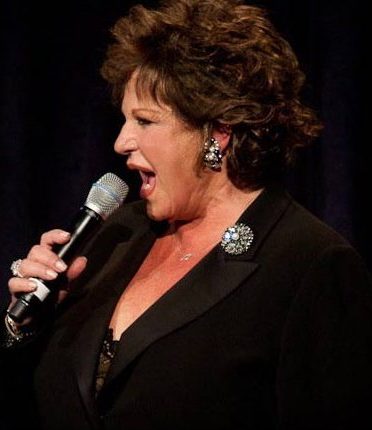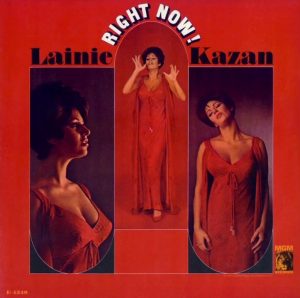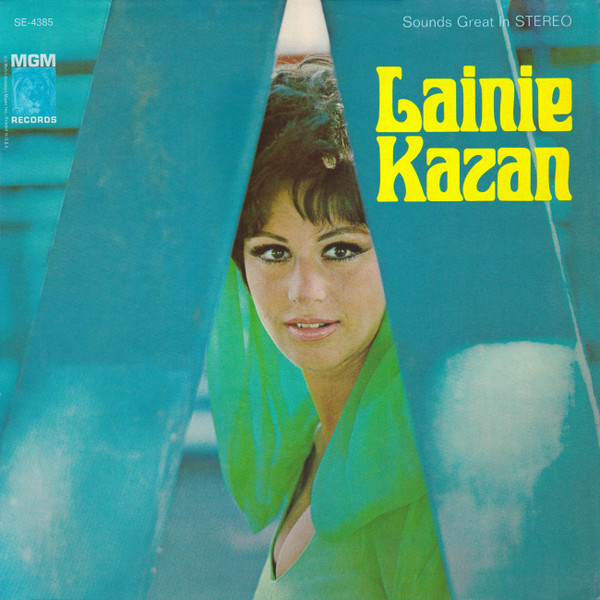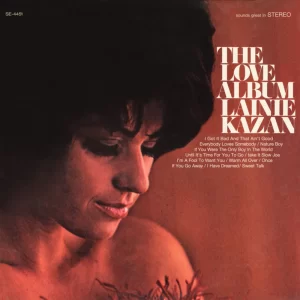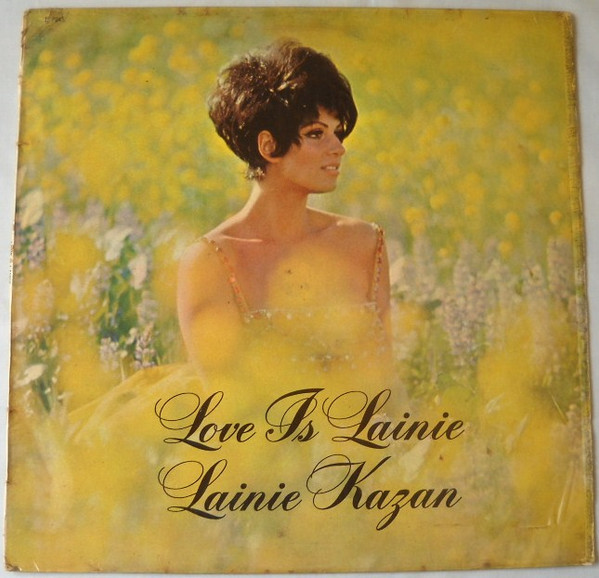Bistro Bits: Kazan Shazam! With Re-Released Albums, the World Gets a Burst of Vintage Lainie
On February 3, 1965, singer-actor Lainie Kazan stepped onto the stage of Manhattan’s Winter Garden Theatre for the first time as Fanny Brice in the Broadway production of Funny Girl, the bio-musical that had opened nearly a year earlier. At that Wednesday matinee, she filled in for ailing star Barbra Streisand in one of musical theatre’s most demanding roles. (The character of Fanny, of course, sings or participates in the singing of the lion’s share of numbers in the show’s score.) Understudy Kazan (also a member of the show’s ensemble) would repeat this feat again in that evening’s performance.
Kazan’s day and night in the spotlight was big news at the time. Reporters from both Time and Newsweek covered the story. And though she would soon leave Funny Girl, her success on that wintry Winter Garden Wednesday paid off. In James Spada’s 1995 biography Streisand: Her Life, Kazan remembered the incident: “I got so much publicity that, within a week, I was swamped with offers. I had a record contract and a nightclub offer.”
At that point, she was not a total stranger to the recording booth. She had participated in the original Broadway recordings of The Happiest Girl in the World and Bravo Giovanni, as well as Funny Girl. But, beginning in 1966 and running through 1968, she would record four lavish, lush-sounding albums for MGM Records.
In a phone interview several weeks ago, Kazan told me that she originally had a contract for a single album. But the success of the initial effort, Right Now!, led to a demand for more:
“I kept getting calls—that it would be great if I could do another one, and another one.”
The second album, Lainie Kazan, came later in 1966. It was followed by The Love Album and Love Is Lainie.
Kazan would go on to have a long, multifaced career—in clubs, on theatre stages, on television, and in films. She would receive accolades, including a Tony nomination for her performance in 1992’s My Favorite Year and the Bistro Awards’ Bob Harrington Lifetime Achievement Bistro in 2013. But those four albums were neglected and largely forgotten over the decades. They had never been given CD releases, so they existed only as vinyl recordings in private collections and could be purchased only from used-record stores or on eBay and similar online outlets.
That all changed earlier this year, however, when two men who counted themselves as Kazan admirers—publicist Dan Fortune and record producer Joe Marchese—took action.
“I got a call from a guy by the name of Dan Fortune,” Kazan said. “He’s been helping—trying to get these albums out. He’s a fan, but he’s also a businessperson that I was very pleased to run into. He worked very hard to get these things released.”
With help from Marchese, Fortune had a breakthrough. Universal Music Group’s Republic Records remastered all four albums, which are now available in streaming format on various platforms. And there are tentative plans to release them all eventually in a box set of CDs.
Explains Marchese, who edits the expansive website The Second Disc (dedicated to the celebration of reissued, remastered, and expanded recordings):
“Dan’s passion and enthusiasm for these records we both loved led me to approach my friends at Universal Music, with whom I’ve collaborated on numerous reissues over the years (particularly from the Motown catalog). Universal, the world’s largest record company, acquired the MGM catalog many years ago. As physical releases take a great deal of time and money to make happen, I inquired with the Universal team about the possibility of digital reissues for these wonderful records. With Lainie’s invaluable support, Universal was receptive—and they more than delivered with these exquisite masters from the pristine original stereo tapes.”
***
Kazan told me that her contract with MGM Records wasn’t her first. In addition to her early appearances on cast albums, she’d also released a single on the Colpix Records label. This, apparently, was 1965’s “The Color of Love.” During our chat, she dismissed it as a “silly song.”
But there was nothing silly about her work on Right Now! and the subsequent three MGM albums. She credits their existence specifically to one man: Peter Daniels. He’d been a pianist for Streisand since the star’s earliest days as a singer and later became a conductor for the original Funny Girl. That’s how he met Kazan, whom he would eventually marry.
“I was very lucky to meet him, find him, love him,” she recalled during our conversation. “He just wanted me to be heard, and he did everything in his power to make that happen. He’s the one who suggested the different arrangers. He was wonderful.”
The original release of Right Now!, which was produced by the much-in-demand Don Costa, coincided with a gig for Kazan at Mister Kelly’s in Chicago. And much of her material for the album consisted of her club repertoire from that time:
“We got these wonderful arrangers to do some very big charts for me. They were based on what I had done with a small group.”
She was pleased with her work on the first album, which allowed her to show off all aspects of her range and overall vocal prowess, including her “legit…top” voice, which is especially prominent in her version of “My Man’s Gone Now” (George and Ira Gershwin, DuBose Heyward) from Porgy and Bess, which makes her sound unapologetically operatic. Listen to part of Kazan’s 1967 performance of this Gershwin classic, from The Ed Sullivan Show HERE.
Marchese: “Because her belt is so powerful and so exciting—and, of course, because of the Funny Girl connection—Lainie has often been compared to Barbra, or to Eydie Gormé. While those comparisons are valid, her vocal style, phrasing, and texture are all her own. Listening to these albums again in these beautiful new remasters, I was stuck by how deftly she adapts from Broadway to pop to folk to art-song territory and never loses a step…. That ‘legit’ sound…is, indeed, a core part of that, and one of those qualities that makes these albums stand out from those of her contemporaries.”
She was not so thrilled while making the second album (Lainie Kazan). This collection (also produced by Costa) necessitated a search for new material, as she’d already used so many titles from her club repertoire for the Right Now! disc.
“I wasn’t pleased with all of it. But I kind of made it work…” she explains. “It was a very haphazard choice of material.”
There were some songs from this album that she did latch onto, including one of the earliest versions ever of Dave Frishberg’s “Peel Me a Grape” (preceding Blossom Dearie’s rendition by a year). She mentioned to me that this number is still in her repertoire, and that she was planning to sing it in a May 7 show at Herb Alpert’s Vibrato Grill Jazz in Los Angeles, where she was scheduled to perform, along with her special guest, granddaughter Bella Blue. Hear an excerpt from Kazan’s 1966 version of “Peel Me…” HERE.
Two more Porgy and Bess songs also appeared on this album, “Summertime” and “I Loves You, Porgy.”
1967’s The Love Album (produced by Pete Spargo) has been touted as “the most lush and sweeping” of the four Kazan collections. It’s also one that Kazan remembers promoting assiduously with personal appearances, including on The Dean Martin Show, where she had become a regular guest performer (as had Kay Medford, who’d played Fanny Brice’s mother Rosie in Funny Girl and now portrayed Martin’s mother in a recurring program segment). Martin wrote the liner notes for this album, and Kazan included her own warm take on his signature song “Everybody Loves Somebody” (Irving Taylor, Ken Lane).
Marchese contends that “these four albums offer a miniature history of mid-’60s pop.” Indeed, each succeeding album embraces a bit more enthusiastically the musical revolution that had evolved and spread quite quickly, filling the airwaves with rock, soul, folk, and R&B acts. On The Love Album (produced by Spargo), Kazan included Buffy Sainte-Marie’s “Until It’s Time for You to Go,” relishing Bob Florence’s arrangement for the tender ballad. Listen to part of this track HERE.
The final album in the lineup, Love Is Lainie, featured even more contemporary pop sounds, including four Burt Bacharach / Hal David tracks, one of which, “The Windows of the World,” is among my own personal favorites. There’s also a rendition of Bobby Hebb’s “Sunny.” Plus, a surprisingly effective version of The Rascals’ “How Can I Be Sure” (Felix Cavaliere / Eddie Brigati). Sample Kazan’s “How Can I Be Sure” HERE.
Kazan says that she, like other singers of “standards” in the mid-1960s, experienced some pressure from her label to include newer sounds on her recordings, in deference to the youth market. But, unlike some established recording artists, she didn’t mind singing these newer musical genres at all.
“I’m not surprised that Lainie enjoyed covering contemporary material,” says Marchese. “[H]er joie de vivre and genuine commitment makes Love Is Lainie a tremendously enjoyable album that avoids the label of ‘kitsch.’ I wouldn’t have minded an entire album of Bacharach and David songs, based on the strength of the four cuts that did make the LP. She similarly invested ‘How Can I Be Sure’ with authenticity—[remaining true] to both her own sound and The Rascals’ composition.”
***
As the mid-1960s lapsed into the late 1960s, Kazan continued her promotional efforts to support her recordings. She told me about a memorable appearance on Philadelphia’s The Mike Douglas Show in 1968. (This may have been part of a week-long stint that spring as Douglas’s co-host.)
“My entire family was on The Mike Douglas Show. There were two sides of the family: the Kazans and the Levines. They played some game out in the street…. They brought all their projects. They brought their cooking…their painting. They brought everything. And we had a ball.”
Looking forward to the possibility of the box set for the four albums, Kazan is now willing to once again make promotional appearances, including—perhaps—a New York show date. “I’m enjoying myself,” she said, “and it’s so much easier this time. I love what I’m doing.”
And she’s filled with gratitude that Fortune and Marchese stepped into her life.
“I can’t believe that this is all happening so many years later…. I didn’t expect to have this in my later years.”
###
About the Author
Mark Dundas Wood is an arts/entertainment journalist and dramaturg. He began writing reviews for BistroAwards.com in 2011. More recently he has contributed "Cabaret Setlist" articles about cabaret repertoire. Other reviews and articles have appeared in theaterscene.net and clydefitchreport.com, as well as in American Theatre and Back Stage. As a dramaturg, he has worked with New Professional Theatre and the New York Musical Theatre Festival. He is currently literary manager for Broad Horizons Theatre Company.





